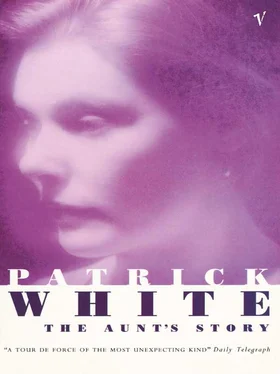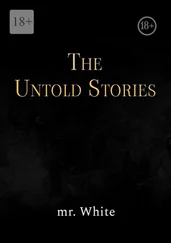Anyway, this time Frank did as he promised. Frank came. He rode through the laurels in a jingling of metal, jumped down with a great report, and there he stood, a reddish gold, against the yellow stone of Meroã. Theodora said: Oh, well.
‘And I shall come,’ said Fanny as they took their guns, ‘even though I don’t shoot. To see Theo make a fool of Frank.’
Fanny pursed her mouth and held her head on one side in order to show the savages she was whimsically superior. Fanny’s face bloomed in the frost beside Frank’s red gold. Why, God, am I this? Theodora asked, knowing that expectation and the temperature had turned her skin a deeper yellow. Now the weight of her gun would not console.
They walked round the side of the hills, the black cone, and, springing from its side, the little, blunter knob. There was a cleft between, from which some ragged trees sprang, instead of smoke. And soon they began to see the ruins of the madman’s folly higher up on the cone.
‘Don’t let’s go up there,’ said Fanny, pulling in her neck.
‘Why,’ asked Frank.
‘It gives me the creeps. That side of the hill. Do you remember old Mr Lestrange, how mad? I went up there once, a long time ago, and he was chewing a piece of bacon rind. Quite mad. And bristles on him, like a red pig.’
Fanny’s face became with her adventure exquisitely funny, in its disgust and fear delicately pink. She pulled at a piece of grass and giggled. Frank laughed too. He could not look at her enough.
‘A rum old cove,’ said Frank. ‘But I can’t remember.’
‘Nor can Fanny,’ said Theodora. ‘Mr Lestrange died when she was two.’
‘But I can, I can!’ cried Fanny. ‘You are quite wrong, Theodora. I can remember-his red bristles.’
‘Mr Lestrange,’ said Theodora, ‘was black.’
‘Anyway,’ said Fanny, she shook her head, ‘it gives me the creeps up there. How are we going to shoot at something when nothing ever comes?’
She looked about, a little too keen, confident that her failure would not detract. She could feel his eyes. He would swallow down any little prettiness she might perpetrate. She could hear Theodora kicking at a piece of stone.
‘Look,’ cried Fanny, ‘there are rabbits. Now,’ she said, ‘you can shoot.’
She gave it to them, but not without contempt, brushing it off her hands.
Frank shot. He missed. There was no subtraction from the scrambling of the rabbit scuts. Theodora took aim. Then they watched the tumbling uncontrol of fur. For a moment time had been put off its course. The fur subsided on the earth. The silence trembled, ticked, ran. It had begun again.
‘One to you,’ said Frank.
His face was redder than from cold. He slapped the butt of his gun with a large hand.
‘I told you,’ said Fanny, ‘that Theo would thrash you.’
But she touched his arm to soften the blow, and her glance excluded Theodora.
They began to walk again. Near the warrens the other side of the hill there were many rabbits, scuttering or still. There was shooting enough. Altogether, in the afternoon, Frank Parrott shot six rabbits. He began to hum. He told them about the time he swam the Barwon River in flood.
‘Come on now, Theo,’ Frank said, ‘you’re not up to form.’
Because, after the first shot, Theodora had not shot another.
‘It’s your day,’ she said.
She walked, and thought: He is like a big balloon that I hold at the end of a string, tightly when I shot the rabbit, but then he soared, as I let him out, giving him the string, the sky. Because the rest of the afternoon she had aimed a little to the right. She had wanted to. She had wanted to feel his child’s pleasure soar, and say this is mine.
‘It’s all very stupid.’ Fanny yawned. ‘I shall drink gallons of tea.’
Theodora heard Frank’s breathing. She did not altogether like her power. So she listened to his breathing dominate her silence, and this was better.
Until the little hawk floated, on his upstretched wings, out of the drained sky, to fold himself, to settle on a white bough.
‘We’ll have a smack at that,’ said Frank, already at his shoulder.
‘No,’ said Theodora, ‘not the little hawk.’
Because she remembered the red eye, and for a moment she quivered, and the whole hillside, in some other upheaval of mythical origin. She knew the white air, closer than a sheath, and the whole cold world was a red eye.
But she said quietly enough, ‘Not the hawk. Please.’
But Frank had fired.
And they watched the hawk unfold his wings, drawn upward off his branch, stream out into long and lovely distances. Because Frank had missed.
‘Good enough,’ Frank said.
Theodora had begun to laugh. She knew with some fear and pleasure that she had lost control. This, she said, is the red eye. And her vision tore at the air, as if it were old wool on a dead sheep. She was as sure as the bones of a hawk in flight.
Now she took her gun. She took aim, and it was like aiming at her own red eye. She could feel the blood-beat the other side of the membrane. And she fired. And it fell. It was an old broken umbrella tumbling off a shoulder.
‘There,’ laughed Theodora, ‘it is done.’
When they were silent, Frank picked up the body of the hawk and hung it on the wire fence. Then Theodora saw that it was, in fact, a little hawk, and that it had a red eye which was half closed. She felt exhausted, but there was no longer any pain. She was as negative as air.
‘Sometimes, Theo,’ Fanny said, ‘you behave as if you are quite mad.’
But Frank did not speak. He bit his moustache. His mind could not lumber further. He was bemused.
They walked on, and their feet made long slurring noises through the cold grass.
After that Theodora often thought of the little hawk she had so deliberately shot. I was wrong, she said, but I shall continue to destroy myself, right down to the last of my several lives. Once she walked past the spot where the hawk hung on the fence, blowing stiffly in the wind. It was her aspiration. In a sense she had succeeded, but at the same time she had failed. If Frank had not understood the extent or exact nature of her failure, it was because he could not. His eyes would remain the same glazed blue.
After the shooting and before the ball, Frank Parrott spoke perhaps half a dozen words to Theodora Goodman. She made him uncomfortable. He would have hated her for the incidnet of the hawk, hated her out of his vanity, but because there was something that he did not understand, he remained instead uneasy, almost a little bit afraid.
Then there was the ball at Parrotts’.
‘I always like to see young people having a good time,’ Mrs Parrott said.
Nobody ever listened when Mrs Parrott made remarks, because they were thin and colourless, but because she was also rich, other people often acted on the spirit of her word. So that now they began to make trifles, and jellies, and pink meringues, and it was agreed that Mr Spurgeon would play the violin, bringing a second fiddle from the livery stable at Sorrel Vale, and a Miss O’Rourke, a teacher, would manage the piano. So it was all fixed, tied up in tulle and satin, and stiff with expectation.
Fanny Geodman was afraid that the lilies of the valley that she wore would die of her excitement. Flowers did die on Fanny when she got hot. But Theodora was momentarily cool. She looked over the wheel as they drove to the ball, and she could not have felt more detached. She watched the last shapes in the paddocks, tree or sheep or matchwood fence, that the darkness still had to swallow down.
Mrs Parrott was all gladness in kid gloves. She was so glad for everything. And Grace Parrott ran forward, and kissed Fanny, and hugged her tight, almost melting with her into the one pink. They could not exchange affection enough, there on the verge of what was still to happen. Their cheeks were rubbed by the warming violins.
Читать дальше












